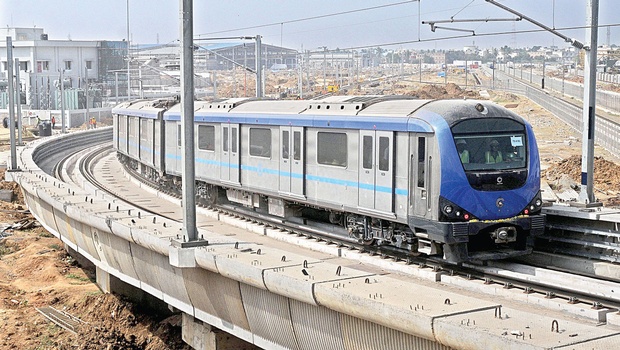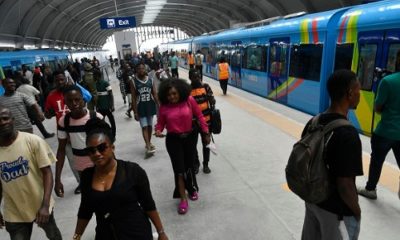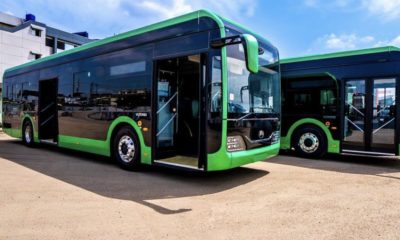Finance
Lagos metro rail transit to cost N456bn, says MD, Infrastructure Bank

ABUJA – Mr Adekunle Oyinloye, Managing Director, The Infrastructure Bank Plc, has said that the proposed Lagos Metro Rail Transit (LMRT) project will cost N456 billion (2.4 billion dollars).
Oyinloye said in an interview in Abuja on Wednesday that the project was expected to cost so much because it involved fixed infrastructure – tracks, stations and rolling stocks.
“We still have some paper work to do with Lagos State for concession. Immediately the concession is done and we have a bankable document and get to finance close then the project will start.
“We are hoping and believing that within the next six to eight months we will be able to get to finance close and we will start,’’ he said.
Oyinloye said the bank was a member of the consortium which created the Marina Express Train Services and partnering to construct the rail line known as “Red Line’’ project.
“Infrastructure bank is also the transaction advisor and finance arranger for the project. It bided for the Red Line project which started since 2008.
“When we got the preferred bidder status, the right of way was not available so we had to work with Lagos Metropolitan Area Transport Authority (LAMATA) and Lagos State Ministry of Transport.
“We also had to work behind the scene with the Ministry of Transport to ensure that the right of way was granted,’’ Oyinloye said.
The right of way for the proposed Iddo-Agbado corridor for Lagos Metro Rail Transit, known as “Red Line’’, was handed over to Lagos State in Abuja on Friday.
Oyinloye expressed gratitude to President Good Luck Jonathan for granting the right of way for which the construction could start.
“There will be changes in the landscape of Lagos. There are about 1.8 million passengers daily who currently spend about four hours daily to get to work and another four hours to get back.
“After the completion of the project, the passengers will now need 30 minutes or maximum of 45 minutes to get to their destinations in a cosy train services.
“If you are living in Agbedo or Agege and you work in CMS area or Victoria Island or you do business in Oke-Arin and Balogun Market you do not need more than 45 minutes to get to your destination,’’ he said.
Oyinloye said the proposed project was delayed due to transfer of asset from the federal to state government which required a lot of engagement and involved several ministries and departments.
The Commissioner of Transportation, Lagos State, Mr Kayode Opeifa, said the project would create direct and indirect jobs during and after the construction.
“It will reduce the cost of transportation and save money for citizens; it will improve our mass transit system by moving more people within a shorter period by decongesting the road and managing the traffic accurately.
“There will be low greener gas emission from the cars and people will be able to move their goods to the market with cheaper rate and more efficient way.
“We are going to link the state and improve tourism. The blue line runs east west from Okukumaiko to Marina while the Red Line runs west to south from Ogun State end to Lagos,’’ he said.
Opeifa, however, said that once the concession was concluded, construction would start with the work expected to last three or four
years.
Mr Dayo Moberuola, Managing Director, LAMATA said the project was initiated by the organisation.
Moberuola said LAMATA identified the need for rail mass transit in Lagos because the state was a mega city and required a backbone for transportation.
“We estimated that 20 million people are moving on daily basis presently in Lagos and in 2030 it is going to be 32 million people that will be moving on daily basis.
“And we can’t do all of that by road rather it has to be done by rail mass transit that is why rail is very important.
“We need to connect to neighbouring city of Ogun State where about 20 to 30 per cent of people who are actually working in Lagos live.
“So by building this rail line it will enable these set of people to be coming into Lagos to work and go back in the evening thereby creating more productivity,’’ he said.
(NAN)
Business
Nigeria pays US$4.9 billion on petrol subsidy in 2024- NNPCL
It was however noted by Biztellers.com.ng, that although subsidy is back in effect, the main reason for that is the increasingly weak state of the Naira and the country’s extreme dependence on products importation. Also unlike the previous subsidy era, where several oil marketers were getting free subsidy refunds for unverified product importation, this subsidy era is witnessing only one importer, the NNPCL, which in effect is the sole receiver of government subsidies.
Yemie ADEOYE
INSPITE of the official position of the Nigerian government that the controversial petrol subsidy is gone for good as announced by the President on assumption of office, the state owned Nigerian National Petroleum Corporation Limited, NNPCL has disclosed that petrol subsidy is still fully operational in Nigeria, although, under a different identity.
Umar Ajiya, Chief Financial Officer at the NNPCL, disclosed that it cost the company a staggering N7.8 trillion (US$4.9) to cover this price gap in the first seven months of 2024.
Rather than simply referring to these claims as subsidies, he stated that the company is merely managing the price difference in petrol imports on behalf of the federation, stressing that this should not be misconstrued as a return to subsidy payments.
![]() This revelation has reignited discussions on whether the NNPC is indirectly offering subsidies, a concept typically defined as selling a product below its cost price.
This revelation has reignited discussions on whether the NNPC is indirectly offering subsidies, a concept typically defined as selling a product below its cost price.
Documents reviewed by Biztellers.com.ng showed that the term “subsidy” was used extensively in official correspondence between the NNPCL and the presidency, particularly in reference to the “shortfall.”
Recall that President Bola Tinubu reportedly approved NNPC’s request to utilize the 2023 final dividends due to the federation to offset these costs.
However, during a media briefing on Monday about the company’s 2023 audited financial statements, Ajiya refuted claims that the NNPC is involved in any subsidy scheme.
Ajiya further disclosed that the Nigerian government owes the NNPC N7.8 trillion ($4.9 billion) in subsidy-related debts for the period from January to July 2024.
In furtherance of his clarification to the News Agency of Nigeria (NAN), Ajiya insisted that no subsidy payments have been made to any marketer in the last nine years, citing the NNPC’s role as the sole importer of petrol under supply contracts.
He said, “In the last eight to nine years, NNPC Ltd. has not paid anyone a dime as a subsidy; no kobo has been disbursed by NNPC Ltd. in the name of subsidy. No marketer has received any payment from us for subsidy.”
“What has been happening is that we have been importing PMS, which has been landing at a specific cost price, and the government tells us to sell it at half price. So the difference between the landing price and that half price is a shortfall.
“And the deal is between the Federation and NNPC Ltd., to reconcile, sometimes they give us money, so there is no money exchanging hands with any marketer in the name of subsidy.”
Ajiya remained silent on how much of the $4.9 billion could have been remitted to the federation account if the NNPC had not been covering the “shortfall.”
It was however noted by Biztellers.com.ng, that although subsidy is back in effect, the main reason for that is the increasingly weak state of the Naira and the country’s extreme dependence on products importation. Also unlike the previous subsidy era, where several oil marketers were getting free subsidy refunds for unverified product importation, this subsidy era is witnessing only one importer, the NNPCL, which in effect is the sole receiver of government subsidies.
Banking
CBN Denies Currency Devaluation

The Central Bank of Nigeria (CBN) has refuted claims of devaluing the.
Earlier reports suggested that the CBN had devalued the Naira, lowering its exchange rate from N631 to the dollar, compared to the previous day’s rate of N461.60 at the Importers and Exporters (I&E) window.
However, the Central Bank of Nigeria (CBN) released a statement on Thursday through its Acting Head of Corporate Communications, Dr. Isa Abdulmumin, categorizing the report as false information.
In the statement titled ‘CBN Has Not Devalued The Naira’, he said the attention of the apex bank was drawn to the news report by an Abuja based newspaper edition of June 1, 2023, titled “CB Devalues Naira To 630/51”.
However, the CBN stated categorically that the news report was replete with outright FALSEHOODS and destabilizing innuendos, ‘reflecting potentially willful ignorance of the said medium as to the workings of the Nigerian Foreign Exchange Market.’
“For the avoidance of doubt, the exchange rate at the Investors’ & Exporters (I&E) window traded this morning (June 1, 2023) at N465/USS1 and has been stable around this rate for a while.
“The public is hereby advised to ignore the news report by Daily Trust in its entirety, as it is speculative and calculated at causing panic in the market,” the CBN spokesman added.
He, therefore, advised media practitioners to verify their facts from the Central Bank of Nigeria before publishing in order not to misinform the public.
Banking
BREAKING: CBN Increases Interest Rate By 0.5%

The interest rate in Nigeria has been raised to 18.5 percent, up by 0.5 percent, from 18 percent where it was pegged in March 2023.
The Central Banks of Nigeria’s (CBN) Monetary Policy Committee (MPC) resolved to this effect at its third meeting of 2023 in Abuja, on Wednesday.
Governor, CBN, Godwin Emefiele, made the disclosure in the communiqué of the MPC’s meeting, thereafter.
While engaging the media at the end of the two-day meeting, Emefiele, said the committee voted to keep the asymmetric corridor at +100 and -700 basis points around the MPR.
In the view of the MPC, rising inflation rate is traceable to the high energy cost and challenges around the supply chain, among others, which lie outside the corridors of the CBN.
Emefiele said, “The current trend in price development would continue to be monitored by the bank with greater collaboration with fiscal authority to address the drivers of inflation.”
Biztellers reports that the CBN had effected six consecutive interest rate increases, which has seen the rate move from 11.5 percent in March 2022 to 18.5 percent in May 2023.
















